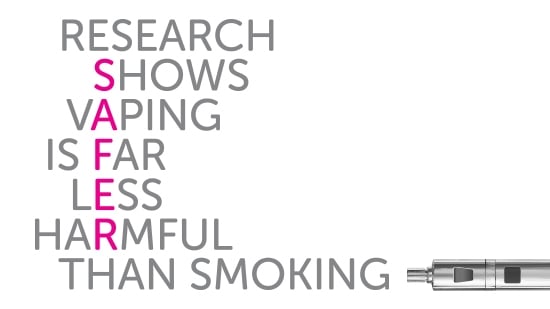Yes, E-cigarettes are safer than smoking.

The results are in, and you already know the answer. Yes, E-cigarettes are safer than smoking!
It may be hard to take that at face value, with the overwhelming assault of negative press that surrounds the industry, the clear majority lacking credible evidence. But now as we step in to 2018, we are holding out hope that this is the year where the facts define the worlds reaction to vaping.
The last 5 years of vaping have been filled with confusing headlines, aggressive condemnation of the industry and a consumer base that doesn’t know who to trust. But now, the research is showing that vaping is not only not dangerous, it excels in its purpose.
In 2017, the first data from a long term study from University College London and King's College showed that participants who vaped had drastically lower toxin levels in their systems than participants that smoked. E-cigarette users had significantly lower NNAL levels than all other groups in the study (barring a control group who used neither).
Further research published in August 2017 from the US National Library of Medicine compared the carcinogenic compounds in E-cigarettes with tobacco products. The results estimated a cancer risk from vaping at around 1% of that from smoking.
The surge of positive research has lead to a change in policy within the UK, including Public Health England’s introduction of vaping into their Stoptober campaign. Not only that, but the British Medical Association and the Royal College of General Practitioners have also come forward with their support of vaping. The UK currently stands as the most supportive country with regards to vaping, but even so, changes are starting to occur internationally. New Zealand and Canada are both in the process of repealing their harsh regulations on E-cigarettes thanks to recent research into the benefits of the industry.
Stigma towards the industry has developed due to a fear that E-cigarettes may lead to as of yet unseen harms. This is particularly focused on concerns that vaping may be a gateway to smoking, with some studies showing evidence that teenagers experimenting with vaping may move to cigarettes in later life. However, the correlation between vaping and smoking has not been proven beyond reasonable doubt, with alternative factors possibly influencing this result more than vaping can.
To offset this even further, the UK and USA are currently in the midst of rapid declines in youth smoking rates. It stands to reason that should vaping be a cause of youth smoking, we wouldn’t be seeing these results.
Opinions of vaping have been victims of a torrent of drastically changing opinions that make finding a consensus difficult. Political alignment, personal sentiment and business ethos have all contributed to the often confusing and muddled reports on vaping.
The available research paints a clear and highly positive picture. What we need is clarity, neutrality, more research and an easier to read picture of vaping’s long term and short term effects.
So, let’s hope 2018 is the year vaping finally achieves legitimacy in the public eye, because frankly, its about damn time.
















